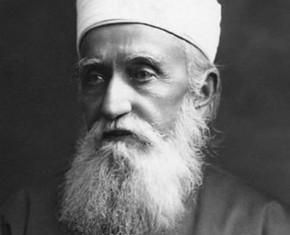The views expressed in our content reflect individual perspectives and do not represent the authoritative views of the Baha'i Faith.
Abdu’l-Baha remained nominally a prisoner under house arrest after his father Baha’u’llah’s passing in 1892, but for several years he enjoyed a relative degree of freedom in Akka. He often made trips to the nearby city of Haifa, and was recognized by high and low as a leading citizen of the area. During that period, Abdu’l-Baha became more renowned than ever for his philanthropy and upright conduct.
However—in the years after the passing of Baha’u’llah, the Ottoman government was gravely threatened by crises from within and pressures from without. Already known in Western circles as the “Sick Man of Europe,” the once mighty Ottoman dominions were slowly disintegrating under the weight of years of mismanagement and corruption. Added to this was the steadily building pressure from rising powers such as Russia, Germany, and Great Britain, which had now entered the high tide of their influence, eager to exploit Ottoman weakness.
The Ottoman sultan, Abdu’l-Hamid, struggling to maintain control of his empire, became acutely sensitive to any reports of rebellion or opposition. In response to a number of rumors and false charges regarding Abdu’l-Baha, the sultan established a four-man Commission of Inquiry, which made its way to Akka immediately.
Rumors began to circulate that Abdu’l-Baha would be exiled to the remote desert in Tripolitania, to be cut off from the rest of the world. One Ottoman official publicly threatened to execute Abdu’l-Baha:
The Turkish Commander-in-Chief, the brutal, the all-powerful and unscrupulous Jamal Pasha, an inveterate enemy of the Faith, through his own ill-founded suspicions and the instigation of its enemies, had already grievously afflicted Abdu’l-Baha, and even expressed his intention of crucifying Him and of razing to the ground the Tomb of Baha’u’llah. – Shoghi Effendi, God Passes By, p. 304.
These events emboldened some people to molest and threaten other Persian Baha’is in the vicinity. Yet through the entire crisis Abdu’l-Baha displayed calmness and courage, assuring the Baha’is that the danger would pass.
Then, one day, the members of the Commission of Inquiry boarded a ship that was to take them back to the capital. The ship set out across the bay in the direction of Akka, surely to take Abdu’l-Baha prisoner, as observers thought. The Baha’is waited in despair, but Abdu’l-Baha was seen serenely walking in the courtyard of his house.
Suddenly the ship changed direction and, in the waning light of sunset, headed for the open sea and disappeared over the horizon.
It turned out that news of a grave crisis in the capital had forced the commission to beat a hasty return to Constantinople. A series of events had been initiated that would culminate in revolution, led by a group known as the Young Turks. Abdu’l-Hamid was too distracted by intrigues closer to home to deal with the case of Abdu’l-Baha. Soon the sultan was deposed, and he would spend the remainder of his life in close confinement.
Just as doom seemed to be closing in on Abdu’l-Baha, the danger had been miraculously averted. Soon the new Young Turks regime issued a decree that all of the political and religious prisoners of Abdu’l-Hamid be freed forthwith. This decree included Abdu’l-Baha.
The year was 1908. Abdu’l-Baha was now sixty-four years old. For fifty-six years, from the time he had been a boy of eight, he had been a prisoner and an exile. Now, for the first time in all those many long years, he was finally free:
I was a prisoner with [Baha’u’llah] for forty years until the Young Turks of the Committee of Union and Progress overthrew the despotism of Abdu’l-Hamid, dethroned him and proclaimed liberty. This committee set me free from tyranny and oppression; otherwise, I should have been in prison until the days of my life were ended. – Abdu’l-Baha, The Promulgation of Universal Peace, p. 203.
Next: The Foundation of the Religions: One and the Same
















Comments
Sign in or create an account
Continue with Googleor